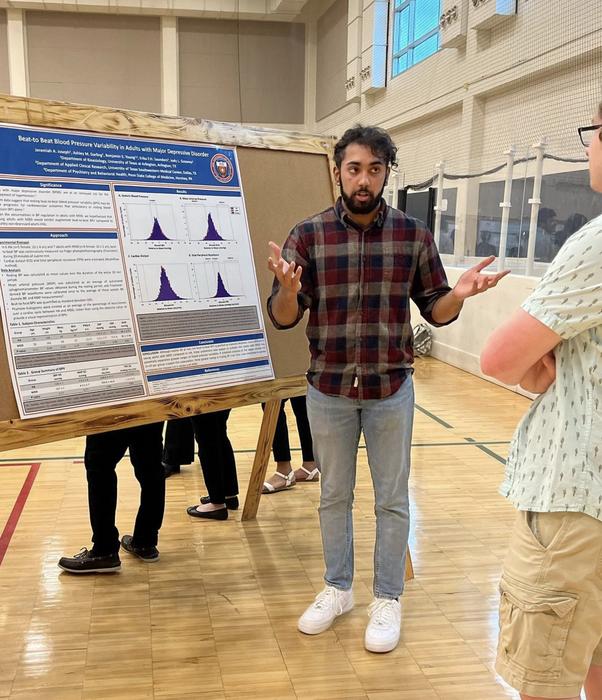Studies have shown that undergraduate students who participate in research activities under the guidance of a faculty member or mentor are more likely to finish college. That’s one of the reasons why The University of Texas at Arlington has tripled its investment in specific undergraduate research opportunities.

Credit: Photo courtesy UT Arlington.
Studies have shown that undergraduate students who participate in research activities under the guidance of a faculty member or mentor are more likely to finish college. That’s one of the reasons why The University of Texas at Arlington has tripled its investment in specific undergraduate research opportunities.
“Engaging students in original scholarship is time-intensive and expensive, but the outcomes are overwhelmingly positive, leading to more student success and an increase in the number of students interested in pursuing graduate school, including medical school,” said Kayunta Johnson-Winters, interim director of undergraduate research at UTA and an associate professor of chemistry and biochemistry.
Under her guidance, UTA increased the number of opportunities in its Undergraduate Research Opportunity Program (UROP) and Undergraduate Research Assistant Program (UGRAP) from about 30 to 100 students per year. Both UROP and UGRAP are paid work-study programs where students are paired with faculty mentors to work on original research, allowing them to gain important professional skills while earning money for college expenses.
“Undergraduate research is much more than just the STEM fields—we have had students from just about every college at UTA, including subjects like history and gender studies,” said Dr. Johnson-Winters. As part of the mentorship experience, “we have monthly meetings with the students in the program to provide academic and professional development, along with support for poster and oral presentations.”
“UROP gave me the opportunity to connect to a mentor and provided me the financial support to pursue a research project,” said Omar Elkassih, a senior studying microbiology and a graduate of Martin High School in Arlington. “During my time in UROP, I was able to work on a project attempting to address a health disparity through the genetic engineering of a bacteriophage. It was an amazing experience that jumpstarted my future in research and has given me invaluable connections.”
Jeremiah Joseph, a Hebron High School alumnus and rising senior studying political science and clinical and applied physiology, initially came to UT Arlington as a coordinated admissions program student, where students spend their freshman year at a participating UT System school, such as UT Arlington or UT San Antonio, with the plan of transferring to UT Austin after a year while meeting specific academic benchmarks.
“During my time in UROP, I had the privilege of working with in the Neurovascular Physiology Laboratory,” he said. “The experiences and support from UROP and my first research lab convinced me to stay at UTA. As a result, I received several research fellowships, created multiple posters, and won scholarships and awards for my research.”
He is currently working on a research project studying heart rate variability among young adults with depression.
According to Johnson-Winters, at the end of their UROP or UGRAP sessions, the students must present their research at a campus-wide symposium where they learn how scientists typically communicate their findings to the broader academic community. In some cases, students were offered travel grants to present their research at national symposiums.
“It’s extremely rewarding to see these students gain confidence in their research skills,” said Johnson-Winters.



